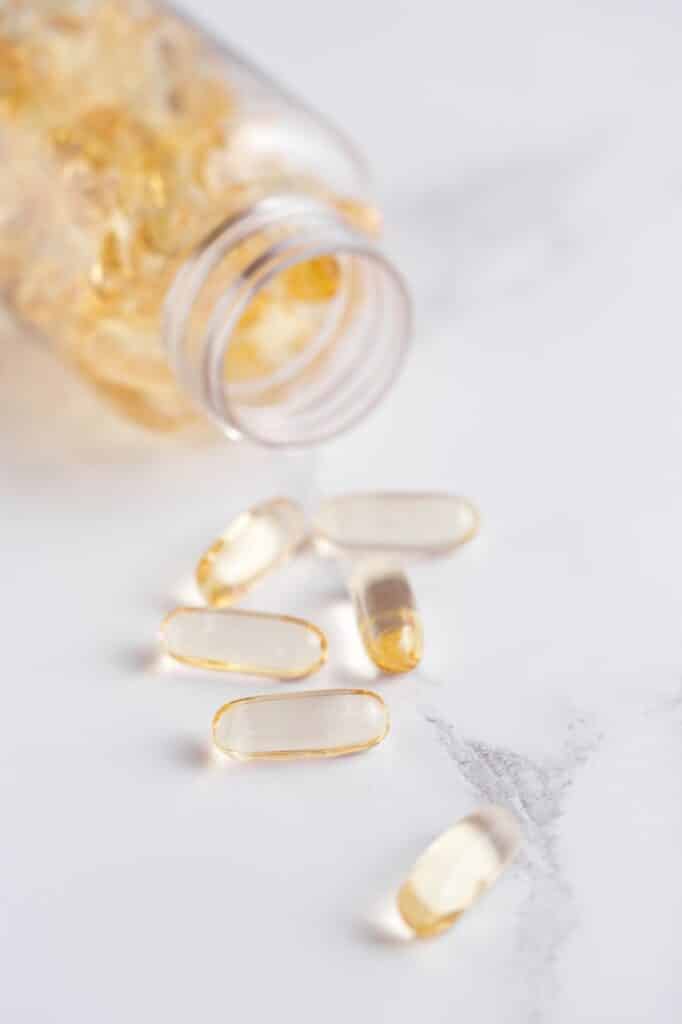If you’re tired of feeling like a heat wave is coming over you, and you want to know how to reduce hot flashes naturally. You’re in the right place!
Before we dive into my tried-and-true tips for reducing hot flashes, it’s helpful to understand a few of the reasons behind why you might be getting them at all.
The HPA-axis, adrenal imbalance and hot flashes:
Hot flashes during the day are often rooted in adrenal imbalance. What exactly does this mean?
Our endocrine (hormonal) system has a triangular pathway called the HPA-axis. It includes the hypothalamus, pituitary and adrenals. These three glands are in constant communication throughout the day.
The hypothalamus is always scanning the body for any kind of stressors (including, physical, emotional, relational, environmental, etc.). When the hypothalamus picks up on stress, it tells the pituitary to tell the adrenals to put out cortisol and other stress hormones. Cortisol is one of our “stress hormones.”
This is normal and okay, except for when it becomes chronic. Chronic stress will begin to deplete the adrenals and overtime create an imbalance in the HPA-axis.
When cortisol production increases from stressors, this can increase core body temperature and cause hot flashes. This is the body’s way of trying to cool itself down and return to the normal core body temperature.
Why do hot flashes happen more often during menopause?
Prior to menopause, the adrenal glands are the secondary source of sex hormone production. This includes estrogen, progesterone and testosterone.
When the body transitions into menopause, it “hands the baton” back to the adrenals and the adrenals are now in charge of making sex hormones such as estrogen, progesterone and testosterone. If the adrenal glands are imbalanced or dysregulated, this is often when you’ll see negative symptoms of menopause.
Here are my top tips to reduce hot flashes naturally:
DIET
1. Eat as many fresh organic vegetables as possible at all three meals with some healthy fats. There is no limit on vegetable intake. I recommend eating mostly cooked vegetables as this is better on the digestive system and it reduces things such as oxalates and goitrogens.
2. Healthy carbs are your friend. This is not the time to cut all carbs. Include healthy, carbohydrates at each meal including fermented sourdough, vegetables and fruits, raw or cultured dairy, and soaked nuts, seeds, grains and legumes.
3. Eat plenty of healthy animal fats. Every hormone produced in the adrenals needs cholesterol in order to be made. This includes the hormones: pregnenolone and prenenolone, estrogens, progesterone, testosterone, dhea and more.
My favorite sources of cholesterol and other healthy fats are pastured eggs, wild seafood and fish eggs, liver and organ meats, full-fat raw and cultured dairy, pastured meats, ghee, butter, lard, tallow, duck fat. While the body can make about 80% of the cholesterol needed to build hormones, it relies on our diet for about the other 20%.
4. Include organic or pastured proteins at each meal. My favorite sources are pastured pork, chicken and eggs as well as grassfed beef and wild caught seafood.
5. Eat magnesium-rich foods. Magnesium is incredibly supportive of the adrenal glands. Magnesium-rich foods include: fatty fish, avocado, and soaked nuts, seeds and legumes. Whole foods high in vitamin C are also beneficial for the adrenals. Good sources are dark leafy greens, broccoli, citrus fruits, kiwi and bell peppers.
6. Remove all processed foods, inflammatory seed and vegetable oils, and refined sugars and grains from your diet. Processed foods are a stressor on the body, and the goal is to remove stressors as much as possible to help support the adrenals.
If you need more direction as to what a nutrient-dense, whole food diet looks like, please see this article: What Is a Nutrient Dense Diet?
A note on when to eat (this is just as important as what you eat!):
1. Eat breakfast within one hour of waking. If you wait any longer than this, it can often cause your blood sugar levels to decrease. This will then tell your adrenals to produce more cortisol.
2. Eat regular meals throughout the day which include some protein, healthy carbohydrates and fats as outlined above. Don’t skip meals! Skipping meals can cause blood sugar to drop, which strains the adrenals.
3. Avoid intermittent fasting. While IF can be very helpful for some health issues, I don’t recommend it when there is adrenal imbalance because it can create additional stress on the body. Please see this video for more information.
HYDRATION
1. Drink filtered water each day. I suggest drinking 1/2 your weight in ounces. For example, a 150-pound person should drink about 75 ounces of filtered water per day. Hydration is important for hormonal balance. Without the right amount of water, the body can’t transport the necessary nutrients and hormones to the cells.
2. As soon as you wake up, drink a glass of water along with 1/4 teaspoon of Celtic sea salt. Throughout the day, have a pinch of sea salt with each glass of water and also use it to season your food. The 80+ minerals in the salt will help nourish the adrenals and endocrine system.
3. Eliminate all caffeine. I get it – this one is hard! But it really can make a big difference in the frequency and severity of your night flashes. Caffeine can be extremely hard on the adrenals, which is why it’s important to cut it out, at least for a period of time.
In this article, I walk you through how I kicked the coffee habit. If you’re looking for more evidence on why cutting caffeine is important to reduce hot flashes naturally, know there is research behind it.
STRESS REDUCTION
1. Only do low-impact exercises. I like walking, pilates, gentle yoga or stretching. High impact exercise puts strain on the adrenals, especially when the adrenals are already fatigued. This might seem counterintuitive if you’re trying to lose weight, but further taxing the body through intense exercise actually can be a barrier to weight loss.
2. Sit down to eat each meal and eat slowly. Don’t eat on-the-go, standing up, in the car or while experiencing negative emotions and stress. Here’s an entire article to help you understand the importance of eating in a slow and relaxed state.
3. Diffuse essential oils that help you feel more relaxed. If you can’t diffuse the oils, put a drop or two on the bottoms of your feet or on the spine twice a day to help lower stress levels. This study found that inhaling lavender essential oil can decrease cortisol levels.
4. Spend more time outdoors. Getting fresh air and being in nature helps reduce the stress response in the body. Being in nature is one of the easiest and least expensive (free!) ways to take care of the adrenals.
5. Slow down. This sounds so simple and so obvious. But think how much time each day you spend hurried, worried or rushing!
It might sound crazy, but I’ve seen some of the biggest improvements in clients’ physical health as they have worked on simply slowing down their mind and body. It is so powerful!
SLEEP + REST
1. The best way to heal your adrenals is with sleep! I suggest trying to get 8-9 hours of sleep a night while healing. Focus on being in bed by 9pm.
2. Take one day of rest each week. The inability to rest will eventually strain the adrenals and “burn them out.” As we learned earlier, continuous output of cortisol will eventually throw the HPA axis out of balance. And with that, hormones can move out of balance.
3. Find time for moments of rest – Turn off your phone. Go outside. Sleep in or go to bed super early if that’s what your body needs. It’s ok. Be gentle with yourself.
SUPPLEMENTATION
1. Consider taking B Vitamins – I love Cataplex B from Standard Process. They also have a gluten-free option.
2. Try adaptogenic herbs. These are supportive of the nervous system. *Ashwaghanda complex is a good place to start. It contains ashwagandha, licorice root and ginseng, which are calming the body. Do know that every body reacts differently to adaptogenic herbs, so it’s okay if you find they’re not for you!
3. Consider taking Drenamin. This is my #1 supplement to support adrenal health. It contains all sorts of nourishing minerals as well as Vitamin C. It is dairy free, gluten free, soy free. One at each meal can be a good place to start.
4. While not technically a supplement, epsom salt baths a few times a week (or each evening, if you can) are a fabulous way to up your body’s magnesium stores.When you’re stressed, the first mineral to become depleted in your body is magnesium. Soaking in a bath with 1 cup of epsom salts and a few drops of your favorite essential oil will help you relax and replenish those magnesium stores.
A FINAL NOTE
Know that you’re in this for the long-haul. It takes a minimum of about 6-9 months to balance the adrenals. For others it can take up to a year. Have a long term mindset. Give yourself grace. Be patient. Speak kindly to yourself.
I hope this is helpful and encouraging! I believe in you!
*Please note this supplement is contraindicated in high blood pressure, edema (water retention), congestive heart failure, low blood potassium, pregnancy and lactation.
**It’s always best to always talk to your practitioner about the supplements that are right for you.
_________________________________________________________________________________________







